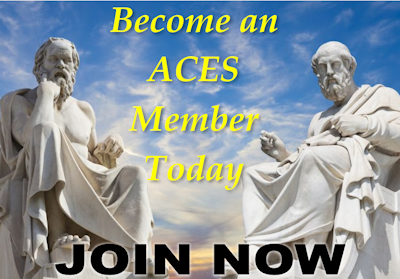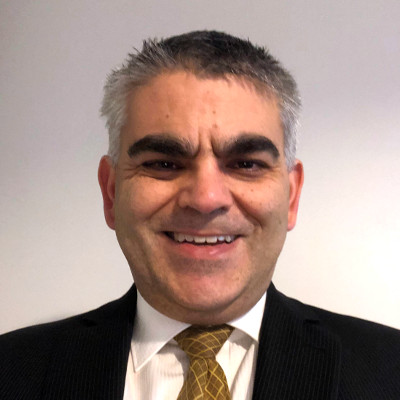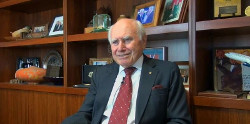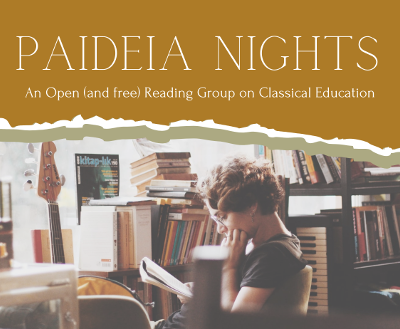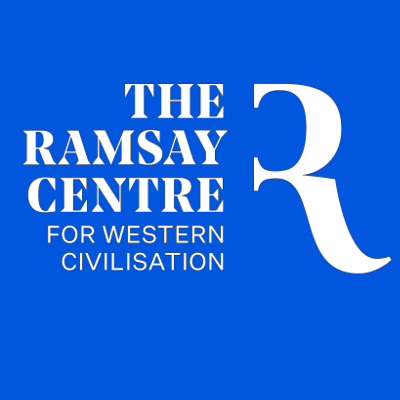Blog
In the first of his lectures delivered in 1805-1806 on the History of Philosophy (Vorlesungen über die Geschichte der Philosophie, not to be confused with his later lectures on the Philosophy of History), Hegel penetratingly remarked:
The name of Greece strikes home to the hearts of men of education… The Greeks have a starting-point in history as truly as they have arisen from out of themselves; this starting-point, comprehended in thought, is the oriental substantiality of the natural unity between the spiritual and the natural.
- Written by: Jonathan Hili
Episode Description
Take a virtual journey down under to learn more about what is happening with classical Christian education in Australia. Dr. Patrick Egan talks with Kon Bouzikos, president of Australian Classical Education Society. Gain insights into the seven schools spread across Australia and the efforts that go into keeping the movement well coordinated and resourced.
Links from this episode:
The Educational Renaissance Podcast is a production of Educational Renaissance where we promote a rebirth of ancient wisdom for the modern era. We seek to inspire educators by fusing the best of modern research with the insights of the great philosophers of education. Join us in the great conversation and share with a friend or colleague to keep the renaissance spreading.
Dr. Patrick Egan's new book, published by Educational Renaissance, entitled Training the Prophetic Voice. is available now through Amazon.
Conor Ross
If the discourse within Australian education is to be believed, our classrooms have never been more inclusive, collaborative, interactive, empowering, and fun. At the same time Australian primary and secondary students have never been as disruptive, aggressive, disengaged, and miserable. In classroom behaviour Australian students ranked 33rd out of the 37 OECD nations, leading to calls for classroom behaviour to be explicitly taught as an academic subject alongside English, Math, and Science. Several longitudinal studies have also reported an increase in anti-social behaviour and violence committed by students against fellow students and staff. The OECD Programme for International Student Assessment (PISA) comparing similar first-world nations has also shown that Australian students experience the second highest level of bullying, only ranking behind Latvia. Predictably this rise in misbehaviour has coincided with the increasing instability of student mental health and school refusal. Students are not the only ones dealing with violence, false rumours, and emotional abuse as this rampant misbehaviour has had a withering effect on the teaching profession. Over 70% of current Australian teachers are considering leaving the profession, 35% of new teachers leave within 5 years, and the fast-tracking of ill-prepared university students into classrooms is set to worsen this. Greater salaries may make a small difference to this shortage but consistently the calls from teachers have been for change to the culture. However, more than just a culture change, what is truly needed is a change to the entire philosophy of modern schools.
Cheree Harvey
“When I began teaching my children, I realized that even though the world said I was educated, I found out I was only schooled.” Leigh Bortins of Classical Conversations fame cuts to the heart of the matter in her book The Core, published in 2010. I am reading this fascinating book for the third time in as many years, as I practice what I preach - spending time thinking deeply with fellow parents about the reasons why and also how I teach my children in the classical, Christian tradition. Is it really the best way? How do I make sure I don’t leave gaps in their education? How will I find a like-minded community? What does it mean to be truly human – a test score or a soul? Slowly, reading one chapter a month has definitely allowed for the truths to be contemplated in a more meaningful, deeper way.
Conor Ross
Old Lady Manning had a dog, so simple and small
that would sit and pant outside with the family all.
The Manning family hobby was wholesome and sweet,
It was to wait for a full moon and hold a porch meet
And talk with delight of this or of that,
to smoke a pipe or count passing bats.
They would play crackajack and stretchy nose
and games plenty else that nobody knows.
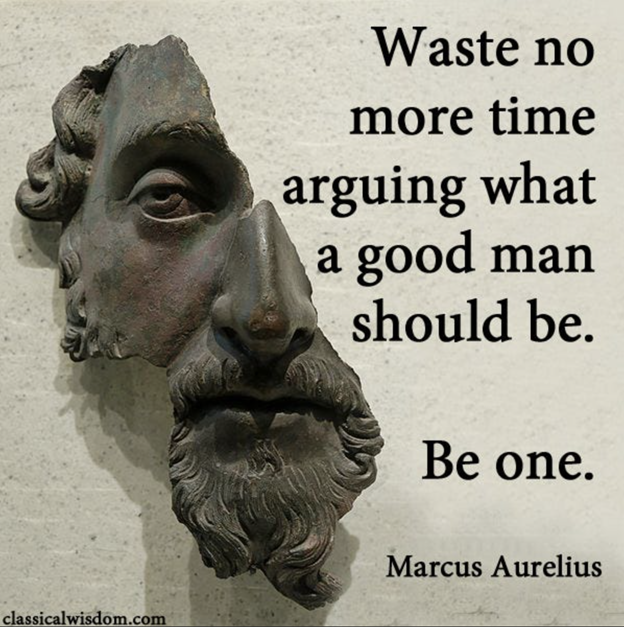
Anya Leonard
Until you read the Classics, you simply don’t know how much of it is around you.
Sure, there are some things that have survived into popular culture, a herculean task to be sure. A few of the Olympic gods, a reference to a wooden horse, a quote about stepping into a river twice might be surmised without having had the opportunity to read and understand the originals... but this is just a simulacrum, a thin veneer of the wisdom and insight gained from the great texts.
In late 2023, ACES launched an ambitious project to develop a classical curriculum package suited to our Australian context that could be adopted (and adapted) by schools. As many of you are aware, a number of sample curricula – some quite detailed and practically ready to pick up and use – already exist in the United States. While purchasing these are helpful in the short-term, what we really lack is a comprehensive curriculum that specifically addresses Australian concerns and, more pointedly, that maps on to the Australian Curriculum.
- Written by: Jonathan Hili
Denise O’Hagan
‘All poetry, as discriminated from the various paradigms of prosody, is prayer.’
-- Samuel Beckett
I never bent my head to tread the short
flight of stone steps down, carefully, or
noticed that they were damply uneven,
dipping in the middle. The silence and
cool never closed their clammy arms
around me, nor did my eyes adapt slowly
to take in the gloom. The single light-bulb,
wire-looped from the peeling ceiling, and
suspended in front of her raised portrait,
never swayed before me. Yet technology
proves an efficient conduit: I enlarge the photo
little by little, notice more. On the low-slung
Conor Ross
Early in October, ACES hosted an immersion course in conjunction with Beautiful Teaching, “Teaching History Classically” with Mark Signorelli leading. Mark has over twenty years of experience as an educator and is the headmaster of Lumen Gentium Academy, a classical Catholic secondary school in New Jersey USA.
Veronika Winkels
Wandering into a newsagent today you will find magazines covering fishing, motorbikes, science, politics, history, new technologies, and more. But the monopoly is still held by what are generally described as ‘women’s interests’: rows and rows of publications about weddings, homes and gardens, cake decorating, craft, health and wellbeing, and, of course, cuisine, couture, and celebrity gossip. How then, could any woman browse these well-stocked sections and still see a gaping hole? Because there is one—where a publication dedicated to the philosophical and cultural contributions of, and impact on, women ought inhabit.
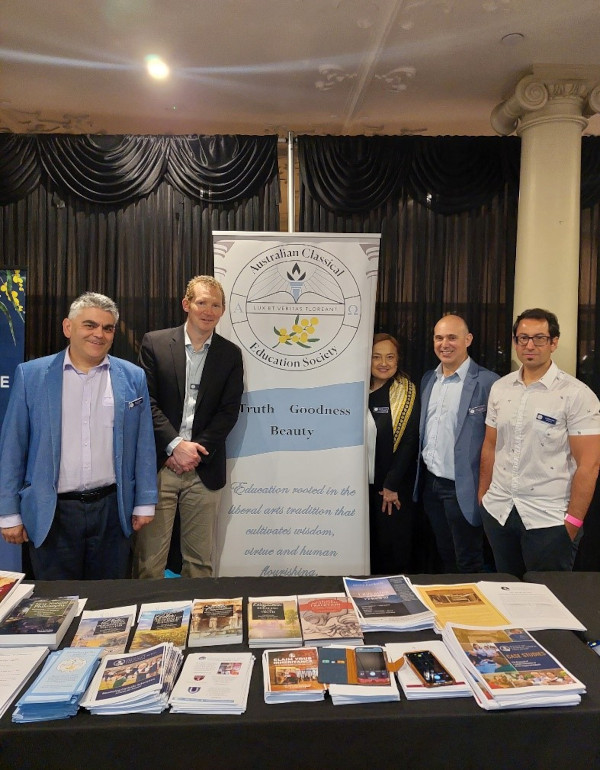
On Saturday 28 October 2023, ACES had the privilege of hosting a stall at the “Benedict Conference”. The gathering was quite sizeable: around 400 in person, with an online streaming presence too. It was held at Australian Catholic University (Cathedral Hall, Melbourne) and principally organised by Fr Dean Mathieson, parish priest of St Joan of Arc, Brighton (Victoria). The focus of the conference was the life and thought of Pope Benedict XVI and how these reflected the transcendentals: truth, goodness and beauty. Accordingly, there was a degree of overlap between the speakers’ presentations and classical education.
- Written by: Jonathan Hili
Patrick Long
‘We believe that teaching is an art and that teacher need to be formed in their craft.’
Beautiful Teaching
When we go ‘through the wardrobe’ in the world of Classical Education, to borrow a phrase from Autumn Kern, we start to look for a map to navigate this wonderful world – I won’t suggest who might be the fawns or White Witches within! It is easy to be overwhelmed by what’s Classical and what is not, what the ‘good bits’ are in more progressive models that can still be used, and so on. Fortunately, Beautiful Teaching, founded by Adrienne Freas, exists to help us find our way this new world of education.
Elizabeth Matheson
Over the past decade, our understanding and interpretation of Australian history has undergone a profound transformation. This remarkable shift has sparked both curiosity and skepticism. Nearly a decade ago, during a casual luncheon, I was taken aback by a confident statement made by an acquaintance. They asserted that indigenous Aboriginal Australians were sophisticated farmers, challenging my understanding of their hunter-gatherer lifestyle. Intrigued and skeptical, I embarked on a journey of investigation, delving into modern scholarship and ultimately creating the book "The Australian History: Pre-History to Settlement," along with a student guide. These resources aim to empower Australian students to explore history, cultivating well-rounded and enlightened learners. A key aspect of this educational approach is fostering critical thinking, logical reasoning, and a deep understanding of the world's intellectual heritage.
Elizabeth Matheson
As a society, we have drifted from instilling concrete virtues in our children, opting instead for a message of tolerance and values. In current times, values are hazy and ever-changing. Instilling concrete virtues in our children has never been more crucial. One way to nurture children's moral imagination and provide them with a moral road map for life's journey is through the timeless magic of classical fairytales. These tales, rooted in Christian beliefs, carry profound themes that can shape young minds and guide them towards becoming virtuous individuals, fulfilling the potential God intended for them.


